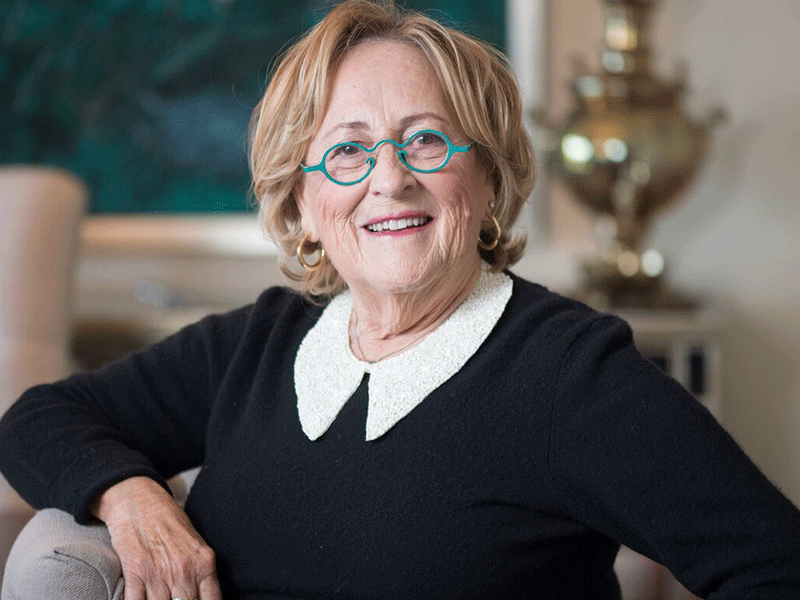Last November, Toronto philanthropist Helen Zukerman received a phone call from the Governor General’s office. A woman told her that she would soon receive a Meritorious Service Medal in honour of her civil service to Canada.
Zukerman says she eventually got teary-eyed from hearing the news, but that wasn’t her initial response. “I said to her, ‘Are you kidding? Is this a joke?’ ”
Zukerman was humbled by the decoration. “There are very few countries in the world where the daughter of immigrants would be granted an award like this,” she says. “I’m just the daughter of factory workers. That’s all I am.”
But the recognition has not changed the way she dives into her work – with passion and enthusiasm. “It’s very flattering to get an award like this, especially because I love what I’m doing so much.”
Although one could see this achievement as a signal to start winding down the workload, Zukerman clearly does not. She remains the artistic director of the Toronto Jewish Film Festival (TJFF), which she helped establish in the early 1990s. Meanwhile, she also runs the charitable Zukerman Family Foundation with her daughters, Aviva and Yona.
Reflecting on the TJFF, Zukerman says she is not surprised by its cultural success and longevity. (This year will be the festival’s 26th iteration, running from May 3 through the 13th.)
The idea for the event came to her when she attended the première of the documentary Half the Kingdom at the San Francisco Jewish Film Festival. She says she wondered why there was no equivalent festival in Toronto.
After seeing a few applications, Revenue Canada granted her permission to put on a festival on a charitable basis for one year. Although Zukerman says she had concerns the festival could be a one-hit wonder, those worries were soon quelled.
“From the moment (the festival) started, it was overwhelming,” she says, adding that screenings at the Bloor Cinema (today the Hot Docs Ted Rogers Cinema) were often full.
Since 1993, the festival has more than tripled the number of films screened – and with an abundance of titles, has provided Toronto audiences with rich, multifaceted depictions of Jewish life from around the world.
“My parents were socialists from Europe, so I didn’t have a lot of religion at home,” says Zukerman, who grew up in Montreal. “I’ve been spending 25, 26 years learning about Judaism all over the world, and mostly how Jews across the world celebrate.”
Nevertheless, the artistic director is still competitive and yearning to expand the festival. One obstacle it faces is the prominence of subscription video-on-demand platforms like Netflix. But Zukerman insists that the access to interesting filmmakers and guests enables the TJFF to be a unique cultural event.
One initiative that excites Zukerman is j-flix, an online streaming service run by the Toronto Jewish Film Foundation that features dozens of films from past festivals. The website aims to bring old favourites and new gems to audiences beyond Toronto.
“It’s nice to give them a new life,” Zukerman says of these titles, many of which were sitting dormant on shelves in the foundation’s conference room.
READ: AT 100, RUTH ROTMAN IS STILL ACTIVE IN THE COMMUNITY
Other challenges include finding content that is both Canadian and Jewish. Although the festival programmers unearth classical offerings from national film and television archives, contemporary films are not always readily available.
Meanwhile, Zukerman’s family foundation – created in the memory of her husband, Barry – has funded projects and organizations beyond the TJFF, including the Canadian Women’s Foundation and Jewish Free Loan Toronto.
Other initiatives they support include Shelter Movers, a volunteer-based organization that assists women and victims of domestic violence as they move out of abusive homes, and the Lions Foundation of Canada, which trains guide dogs to help Canadians with a “wide range of disabilities.”
“You get to meet the most wonderful people, because they’re trying to make a difference,” Zukerman says. “And that’s very nourishing.”
After decades of public service, Zukerman says she feels fulfilled about her life’s work.“It’s nice to walk in the world and feel,” she says. “I feel that most people are good, I really do.”
